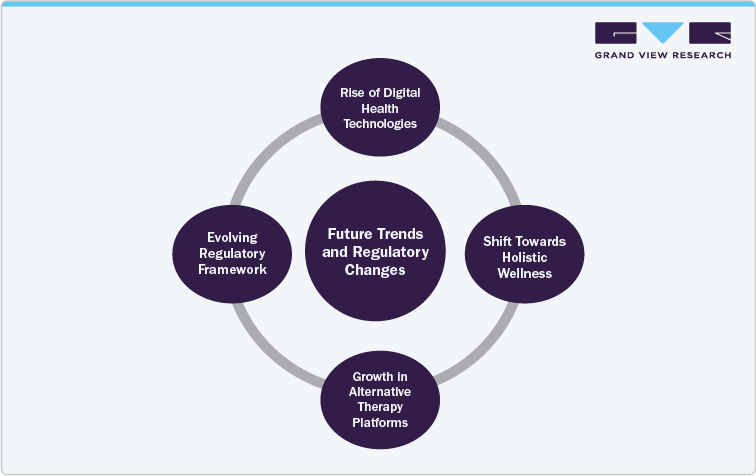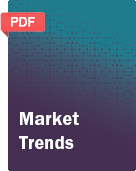Report Overview
The complementary and alternative therapy (CAT) market in the United Arab Emirates (UAE) has witnessed significant growth in recent years, reflecting a global trend of holistic health practices. The market is segmented based on therapy types, including acupuncture, chiropractic, homeopathy, naturopathy, psychology, counseling, and life coaching. As of 2023, significant regulatory progress has been made to standardize practices across different Emirates.
In the UAE, each Emirate has its own distinct licensing authority overseeing Complementary and Alternative Medicine (CAM) practices. In Dubai, the Dubai Health Authority (DHA) regulates CAM practitioners and ensures compliance with local standards. Abu Dhabi's Department of Health - Abu Dhabi (DOH) manages licensing and regulatory requirements within the Emirate, while Sharjah's Health Authority (HAS) oversees CAM practices in Sharjah. Practitioners must obtain specific licenses from the relevant authority in each Emirate where they intend to operate, as licensing is not automatically transferable across Emirates.
For therapies like acupuncture, chiropractic, homeopathy, & naturopathy, practitioners need to meet specific educational and professional criteria, including recognized certifications and qualifications mentioned by regulatory bodies of respective emirates of UAE. Psychology and counseling require licenses that often include proof of relevant degrees and experience. Life coaching typically necessitates certification from recognized international bodies and registration with local health authorities.
UAE Complementary And Alternative Therapy Market: Regulatory & Licensing Trend Analysis Report Scope
|
Report Attributes |
Details |
|
Areas of Research |
Regulatory and Licensing Requirements, Licensing Framework, Intervention Regulatory Analysis, Licensing Scenario by Emirates, Future Trends and Regulatory Changes |
|
Report Representation |
Consolidated report in PDF format |
|
Emirates Coverage |
6+ Emirates in UAE |
|
Highlights of Report |
|
Licensing Framework: Regulatory and Licensing in UAE Complementary and Alternative Therapy Market
Dubai Health Authority (DHA) Licensing
The DHA was established in June 2007 through Law No. 13 issued by His Highness Sheikh Mohammed bin Rashid Al Maktoum, Vice President and Prime Minister of the UAE and Ruler of Dubai. The formation of DHA marked a significant step toward centralizing and enhancing healthcare services in Dubai.
Before DHA's establishment, healthcare services were managed by the Department of Health and Medical Services (DOHMS), founded in 1973. The transition to DHA was aimed at streamlining healthcare governance, improving service quality, and fostering growth in the health sector by adopting international best practices.
Community Development Authority (CDA) Licensing
Founded in July 2008 by decree of H.H. Sheikh Mohammed bin Rashid Al Maktoum, Vice-President and Prime Minister of the UAE and Ruler of Dubai, the Community Development Authority (CDA) is tasked with advancing social development in Dubai.
The CDA is responsible for overseeing the delivery and enhancement of social services, ensuring an integrated and effective management system for social development. Its roles include the formulation, implementation, and supervision of comprehensive strategic plans, as well as proposing legislation to improve social service outcomes.
Licensing for Non-Regulated Disciplines
The DHA oversees various disciplines under Traditional, Complementary, and Alternative Medicine (TCAM) practices. Although many TCAM disciplines are regulated with specific licensing and scope-of-practice requirements, there are also non-regulated disciplines that are recognized but do not have the same stringent regulatory oversight. Non-regulated disciplines are generally allowed to operate within Dubai but do not require a DHA license, though they must still adhere to general healthcare and ethical standards.
Licensing Scenario by Emirate Analysis
The transfer process for healthcare professionals across different Emirates in the UAE, such as moving between Health Authority Abu Dhabi (HAAD), Dubai Health Authority (DHA), and Ministry of Health (MOH) jurisdictions, can be complex. Practitioners must apply for a "transfer of license" when relocating but holding a license in one authority does not guarantee automatic approval in another. Each authority, including DHA, MOH, and HAAD, has specific licensure requirements that must be fulfilled as per their Professional Qualification Requirements (PQR).
For HAAD transfers, the process involves additional steps, including repeating Data Flow Verification, even if previously completed. Furthermore, those applying for a HAAD license must have their credentialing linked to an employer; failure to do so will result in an automatic rejection, requiring the entire process to be restarted.
The process for transferring a healthcare professional’s license between facilities in the UAE involves several steps and costs around AED 100 (USD 27.23)
Table 1 The process of transfer of a doctor's license across the UAE
|
SL |
Process Steps |
Description |
|
1 |
Login |
Access the MOHAP website or smart app using the UAE PASS |
|
2 |
Submission |
The facility submits the required information and documents via the licensed facility's account |
|
3 |
Review by MOHAP |
MOHAP checks the application; if requirements are met, approval is granted |
|
4 |
Fee Payment |
The facility pays the fees online via the website |
|
5 |
Final Review |
MOHAP conducts a final review and approves the application if all conditions are met |
|
6 |
License Issuance |
For final licenses (new, re-license, or transfer), the facility submits documents for MOHAP’s approval and issuance of the license |
Table 2 Documents required for transfer of a doctor's license across the UAE
|
SL |
Required Documents |
Details |
|
1 |
Letter From the Facility |
Requesting the transfer of the professional’s license |
|
2 |
Employment Contract |
Copy of the healthcare professional's employment contract |
|
3 |
Copy of License or ID Card |
A valid license or identification card |
|
4 |
No Objection Letter |
Letter of no objection from the current employer |
|
5 |
Facility's Plan |
The facility's operational plan for the professional’s role |
In the UAE, healthcare professionals must navigate specific procedures to transfer their licenses between health authorities. The MOH Evaluation Certificate confirms that a candidate has passed the MOHAP prometric exam conducted by the Ministry of Health and Prevention (MOHAP) but does not indicate employment in MOH-controlled facilities. In contrast, the MOH License is an official permit obtained after securing a position within a MOH-controlled facility, applicable across any of the UAE's five emirates: Sharjah, Ajman, Umm Al-Quwain, Ras Al-Khaimah, and Fujairah.
Future Trends And Regulatory Changes
Digital health technologies are revolutionizing the core of health and care through digitally enabled models such as virtual care, remote monitoring, and interactive, patient-centered tools. This shift emphasizes the move toward tech-enabled care models that offer anywhere, anytime access to health services, either at home or within the community. In December 2021, NirogStreet, an online platform offering Ayurveda doctor consultations, secured USD million in funding from UAE-based CE Ventures and Japan's ICMG Partners. The growth of online platforms like NirogStreet is expected to facilitate easier access to Ayurvedic consultations, expanding the reach of complementary and alternative therapies.

Furthermore, these advancements pave the way for innovative cross-border services, although they must navigate legal and regulatory considerations. As individuals become more health-conscious, our understanding of health is evolving. The focus is shifting from traditional sick-care systems to a broader approach encompassing wellness, chronic care, and population health. This evolving perspective integrates mental health, social determinants, and environmental factors into a more diverse, integrated, and seamless system of care.
Summary of Key Licensing and Regulatory Insights
The licensing and regulatory landscape for the UAE Complementary and Alternative Therapy (CAM) market is governed by several authorities, including the Ministry of Health (MOH), Dubai Health Authority (DHA), and Department of Health Abu Dhabi (DOH), each with distinct guidelines.
Practitioners in fields such as Naturopathy, Ayurveda, Homeopathy, Traditional Chinese Medicine (TCM), and Osteopathy must obtain licenses from the respective regulatory body in the emirate where they practice. The licensing process typically involves completing accredited educational programs, passing competency exams, and meeting experience criteria. For specific modalities like acupuncture, practitioners are required to have healthcare backgrounds such as physiotherapy or nursing.
The regulations ensure patient safety and uphold international best practices. Licensing requirements in Dubai, Abu Dhabi, and Sharjah show similarities but also have notable differences, particularly in professional qualification standards and registration processes. Dubai (DHA) is known for having a more streamlined application process, while Abu Dhabi (DOH) emphasizes strict compliance with national healthcare standards.





